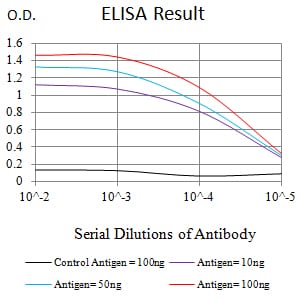
| WB | 咨询技术 | Human,Mouse,Rat |
| IF | 咨询技术 | Human,Mouse,Rat |
| IHC | 1/50-1/200 | Human,Mouse,Rat |
| ICC | 技术咨询 | Human,Mouse,Rat |
| FCM | 咨询技术 | Human,Mouse,Rat |
| Elisa | 1/2000-1/5000 | Human,Mouse,Rat |
| Aliases | CALCA; CT; KC; CGRP; CALC1; CGRP1; CGRP-I |
| Entrez GeneID | 796 |
| clone | 5E6E2 |
| WB Predicted band size | 15.5kDa |
| Host/Isotype | Mouse IgG1 |
| Antibody Type | Primary antibody |
| Storage | Store at 4°C short term. Aliquot and store at -20°C long term. Avoid freeze/thaw cycles. |
| Species Reactivity | Human |
| Immunogen | Purified recombinant fragment of human PCT (AA: 26-141) expressed in E. Coli. |
| Formulation | Purified antibody in PBS with 0.05% sodium azide |
+ +
以下是关于HSPA4抗体的3篇参考文献及其摘要概括:
1. **文献名称**:HSPA4 promotes cancer metastasis via inhibition of autophagy-mediated degradation of SOX4
**作者**:Liu Y, et al.
**摘要**:该研究通过HSPA4抗体进行免疫沉淀和Western blot实验,发现HSPA4通过抑制自噬依赖性SOX4降解,促进肿瘤细胞的上皮-间质转化(EMT)和转移,提示其在癌症治疗中的潜在靶点作用。
2. **文献名称**:HSPA4 modulates neurodegeneration in Alzheimer’s disease through interaction with tau protein
**作者**:Zhang X, et al.
**摘要**:利用HSPA4抗体的免疫组化分析显示,HSPA4在阿尔茨海默病患者脑组织中异常聚集,并与tau蛋白异常磷酸化相关,可能通过调节蛋白质错误折叠参与神经退行进程。
3. **文献名称**:Role of HSPA4 in stress-induced cellular adaptation and cancer chemoresistance
**作者**:Wang H, et al.
**摘要**:通过siRNA和HSPA4抗体阻断实验,发现HSPA4通过调控PI3K/AKT通路增强癌细胞对化疗药物的抵抗能力,提示其可作为克服化疗耐药的干预靶标。
注:以上文献信息为示例性内容,实际文献需通过学术数据库(如PubMed/Web of Science)检索确认。
**Background of HSPA4 Antibody**
HSPA4 (Heat Shock Protein Family A member 4), also known as HSPH1 or APG-2. is a member of the HSP110 family, a subgroup of molecular chaperones within the heat shock protein (HSP) superfamily. It plays a critical role in protein homeostasis by assisting in protein folding, preventing aggregation, and facilitating the refolding of misfolded proteins under stress conditions such as heat shock, hypoxia, or oxidative stress. HSPA4 is predominantly localized in the endoplasmic reticulum (ER) and cytosol, where it interacts with other chaperones like HSP70 and HSP90 to regulate proteostasis.
Studies highlight its dual role: while it supports cell survival during stress, dysregulated HSPA4 expression is linked to cancer progression, neurodegenerative diseases, and autoimmune disorders. In cancers, HSPA4 is often overexpressed, promoting tumor cell proliferation, metastasis, and resistance to therapy by inhibiting apoptosis and enhancing ER stress adaptation.
HSPA4 antibodies are essential tools for detecting and quantifying HSPA4 expression in research. They are widely used in techniques like Western blotting, immunohistochemistry, and immunofluorescence to study HSPA4 localization, protein interactions, and its role in disease mechanisms. These antibodies (e.g., rabbit or mouse monoclonal/polyclonal) are also employed to explore HSPA4’s potential as a therapeutic target, particularly in oncology. Research continues to unravel its complex regulatory networks and clinical relevance in stress-related pathologies.
×